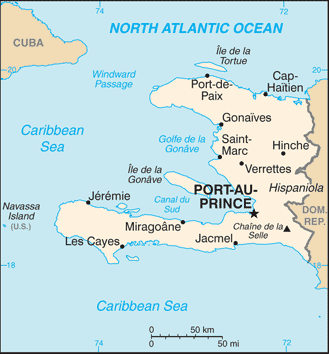
Washington, DC–(ENEWSPF)–October 3, 2016. The State Department warns U.S. citizens of the approach of Hurricane Matthew and recommends U.S. citizens defer travel to Haiti. This Travel Warning updates the Travel Warning issued on July 18, 2016.
The National Hurricane Center (NHC; www.nhc.noaa.gov) reports a hurricane warning has been issued for most of Haiti. A hurricane warning means that hurricane conditions are expected within the warning area, generally within 36 hours. Hurricane storm conditions in terms of wind are expected to reach the area by October 2. U.S. citizens residing and traveling in coastal areas through out Haiti, especially on the southern peninsula including the cities of Jeremie, Les Kayes, and Jacmel should be alert to very strong winds, heavy rain fall, and flooding.
Given the approaching hurricane, there is limited time available for a safe departure. The Department of State has authorized family members of U.S. government employees to depart Haiti in advance of Hurricane Matthew. We recommend U.S. citizens depart Haiti if possible and work with commercial air carriers to leave prior to the arrival of the hurricane. Airports will close once conditions deteriorate and safe travel is not possible. We recommend those citizens who are unable to depart to shelter in place in a secure location.
Travelers should apprise family and friends in the United States of their whereabouts, and keep in close contact with their tour operator, hotel staff, and local officials for evacuation instructions. Travelers should also protect their travel and identity documents against loss or damage, as the need to replace lost documentation could hamper or delay return to the United States.
Emergency Response: Medical care infrastructure, including road ambulance and other emergency services, is very limited in Haiti. Some U.S. citizens injured in accidents and others with serious health concerns have been unable to find necessary medical care in Haiti and have had to arrange and pay for medical evacuation to the United States. We strongly encourage travelers to Haiti to obtain medical evacuation insurance prior to arrival in country and to use evacuation organizations that have solid evacuation and medical support options in place. Moreover, those traveling in rural areas of Haiti should verify their evacuation organization provides service to where they are traveling.
Crime: Reports of kidnappings of U.S. citizens have fallen off sharply, with few incidents reported to the Embassy in 2016, but kidnapping for ransom can still affect anyone in Haiti, most particularly those maintaining long-term residency in the country. Armed robbery is a very real possibility, especially in the Port-au-Prince area and in particular soon after leaving the airport. Be circumspect in sharing specific travel plans; have your host or organization meet you at the airport upon arrival; and/or have pre-arranged airport transfers and hotels. Exercise caution when visiting banks in Port-au-Prince. Robbery crews have been known to survey banks and rob customers as they exit. Fewer incidents of crime are reported outside of Port-Au-Prince, but Haitian authorities’ ability to respond to emergencies is limited and in some areas nonexistent.
Embassy employees are required to adhere to all security and safety measures of the Embassy’s Regional Security Office when traveling outside of Port-au-Prince, as well as restrictions on travel in certain areas or times. U.S. Embassy personnel are under an Embassy-imposed curfew from 1:00 a.m. to 5:00 a.m. and must remain at home or another safe facility during curfew hours. This may constrain the Embassy’s ability to provide emergency services to U.S. citizens outside of Port-au-Prince or regular business hours. Additionally, in Port-au-Prince and other cities, U.S. Embassy employees are advised not to walk in any area but rather drive to a destination and park as close as possible, choosing guarded or interior parking lots. This includes Petionville, an area of metropolitan Port-au-Prince of upscale hotels, shopping and restaurants frequented by residents and visitors. For additional details on restrictions on staff travel within Haiti, please see our Country Specific Information for Haiti.
Civil Unrest: Protests, including road and bridge blockages, are frequent and often spontaneous. The Haitian National Police (HNP), with assistance from the United Nations’ Stabilization Mission in Haiti (MINUSTAH), is responsible for maintaining order and rendering assistance. However, the HNP’s ability to assist U.S. citizens during disturbances is limited. U.S. government-facilitated evacuations, such as the evacuation that took place from Haiti in 2010, occur only when no safe commercial alternatives exist. Please see our website for additional information on how the Department of State assists U.S. citizens during a crisis.
For further information:
- See the State Department’s travel website for the Worldwide Caution, Travel Warnings, Travel Alerts, and Country Specific Information for Haiti.
- Enroll in the Smart Traveler Enrollment Program (STEP) to receive security messages and make it easier to locate you in an emergency.
- Contact the U.S. Citizen Services Unit of the U.S. Embassy’s Consular Section, located at Tabarre 41, Boulevard du 15 Octobre, Tabarre, Haiti; telephone 509-2229-8000; e-mail ([email protected]).
- Call 1-888-407-4747 toll-free in the United States and Canada or 1-202-501-4444 from other countries from 8:00 a.m. to 8:00 p.m. Eastern Standard Time, Monday through Friday (except U.S. federal holidays).
- Follow us on Twitter and Facebook.
Source: http://state.gov








